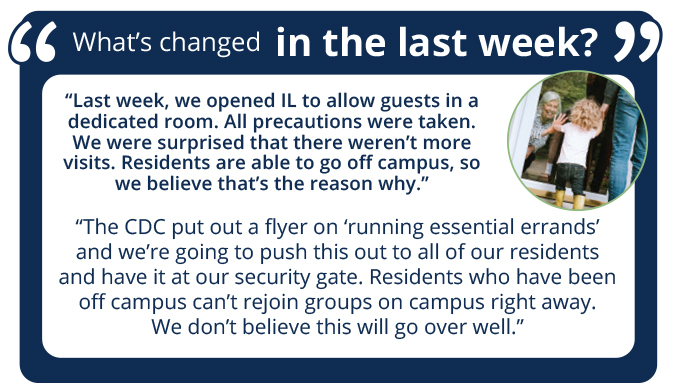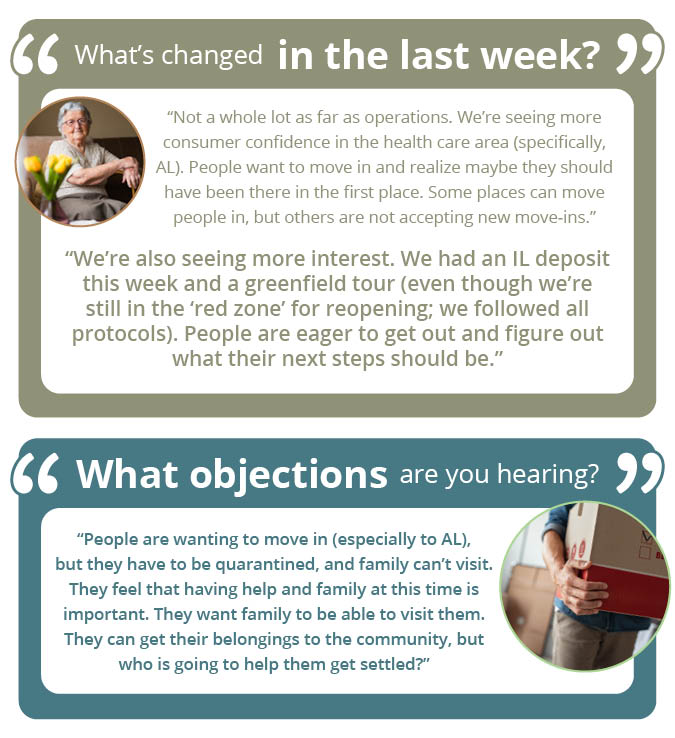In this guest post, Jill Janes, vice president of sales and marketing at Methodist Retirement Communities (MRC), shares her secrets for selling and marketing communities during challenging times. A former stay-at-home mom, Jill first worked in senior living as a temp and split-shift cook. She was quickly promoted to receptionist, then told by her superiors, “You should be in marketing.” After hitting sales records and winning promotions, Jill became a regional manager across Kansas and Missouri; then, she was recruited to MRC, back in her home state of Texas.
Sales is about getting around barriers. If you’re a real salesperson to the core, and a true professional, the COVID-19 situation is just another obstacle you have to work around. It’s done nothing for our team but stimulate our creativity. Here’s one strategy we’ve been using during these times: the blue-sky approach.
The reason why people like selling brand-new blue-sky communities is that the number one objection to senior living is, “I’m not ready yet.” The reason why blue sky is so fun to sell—and why so many salespeople are successful at it—is that, when people say, “I’m not ready yet,” we reply with: “No problem—neither are we! The place isn’t even built yet. Relax. Enjoy these community benefits while you wait.”
It’s a low-pressure way to gain commitment for a promised move-in down the road.
Over 40 percent of people who put down a blue-sky deposit will cancel, and that’s okay. They give the gift of urgency to the market—the pressure builds for other people to get more skin in the game. Even if they cancel, they help build a viable path to achieving sales goals. As salespeople, we enter a blue-sky situation knowing full well that everyone who deposits isn’t moving in.
During COVID-19, we can use a blue-sky approach to existing inventory. We can take a risk-free, fully refundable deposit from a potential resident without the pressure of a move-in date, but with the right of first refusal.
Prospects can choose a risk-free, fully refundable deposit, with priority access to care, and the opportunity to move in when they’re ready. If someone comes along behind them, interested in the community, the original prospect has the right of first refusal. In this scenario, we can call the original prospect, and ask them to schedule a move-in date within 90 days of the phone call.
What we’re finding is that, when someone has a deposit but no move-in date (they’re on the fence), someone else being ready to move in helps enormously. Eventually these depositors are inclined to say, “We need to do this; we’re going to miss out on this opportunity. We would love a situation where we don’t have to muscle through the grocery store because we ran out of toilet paper.”
The more deposits we get, the more we’re able to create that sense of urgency among depositors.
For example, we can then say to the other prospect, “I’m sorry; this couple is going to take the apartment. Let’s look at our second choice.” From there, we ask the people who have the deposit on the second apartment if they’re ready. They say, “We’re going to move in.” So we say, again, “Sorry, the second couple says they’re going to move in; let’s go to your third choice.” Before we know it, we’ve got three move-ins.
This type of blue-sky strategy can continue, too, as the world looks different post-COVID-19. We can create a benefit package and give people lower-pressure opportunities to invest in their future.
To keep people interested once they’ve put down a deposit, we have to change our tactics. You can learn more about how we’re bringing the community experience to depositors at home in an upcoming blog.






